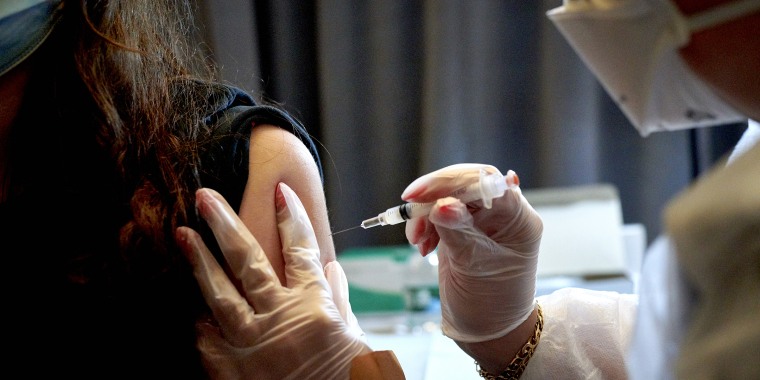As the omicron variant causes a surge in coronavirus cases in the United States and around the world, public health experts are urging eligible people to get their booster dose of the COVID-19 vaccines.
Booster eligibility varies based off when you received your vaccine and which vaccine you received. Those who got the one-shot Johnson & Johnson vaccine should get a booster shot (the CDC recommends a mRNA vaccine in most cases) two months after getting the vaccine, while those who received either the Moderna should get a booster shot six months after their second dose. Those who received the Pfizer-BioNTech COVID-19 vaccine can get a booster five months after the second shot of the primary series.
"From a public health perspective, we're trying to encourage everybody to get boosters when they're eligible," said Dr. Lauren Block, a primary care physician and researcher at the Feinstein Institutes for Medical Research. "The benefit of getting the booster is enhanced immunity, particularly against the omicron variant ... Which is increasingly prevalent as the major strain."
Why do I need a booster shot?
Block said that the main reason people need a booster shot is because immunity from the vaccine "wanes" with time. (Immunity from being infected with COVID-19, sometimes referred to as natural immunity, is also reduced with time.)
"The initial data that came out (said) that the Pfizer and Moderna vaccines had a 95% effectiveness at preventing COVID infection. Now, with time, that wanes to about 35%," Block explained. "Getting a booster, even against omicron, can bring the effectiveness of the vaccine back up to 75%. Comparing 35% protection to 75% is a huge reason to protect yourself and your family."
Dr. Sten Vermund, the dean of the Yale School of Public Health, explained that the omicron variant is increasing the need for booster shots. While it was "nice" to have the third dose and its increased immune protection against the delta variant and initial strain of the virus, Vermund said it "seems to be more essential" against omicron.
"For the exact same reason people got vaccinated to begin with, which is to reduce the serious consequences of infection, they should get the booster, because we now have new strains circulating and the higher the immune response, the higher the antibody levels, the greater the protection is from these new strains," Vermund said. "To me, it's a no brainer: Everybody ought to get a booster."
Boosters prevent severe outcomes
Much like the initial vaccines, boosters will prevent severe COVID-19 infection, Vermund said.
"There's a technical term, called avidity, and that's sort of how good a lock-and-key fit is there between the immunity induced by the vaccine and the circulating variants," Vermund said. "If the lock and key is really good, then two shots seems to be fine. But if the lock and key is not quite as good a fit, like with omicron, then we need a third booster to push the antibody levels up high enough to overcome the fact that the fit is not quite as good."
"The booster is going to help the body mount a quicker and more efficient immune response against the invader, and that's what we want," Vermund added.
With news that coronavirus cases caused by the omicron variant are more mild, Vermund said that experts are less bothered by breakthrough infections and are instead focused on preventing severe outcomes like hospitalizations and deaths.
"We are not so bothered by infection. There are lots of viruses that infect us and don't case us too much harm," said Vermund. "What we want to do is avoid serious consequences of the virus ... Ultimately we're looking to reduce the serious consequences of infection, not infection itself. It's great if we avoid a symptomatic infection. That's one less nuisance that we have to worry about in our lives. But it's not so serious to get infected if you are thoroughly immunized."
Vermund said that while there is still not "strong data" on booster shots and "long COVID," the term for lasting coronavirus symptoms like brain fog and fatigue, it is "highly probable" that boosters and vaccination will reduce the risk of the syndrome.
"The vaccines will blunt the replication of the virus in the human. It will inhibit the virus from doing its dirty work, it will reduce the viral load and it will limit the number of days that the virus is circulating," said Vermund. "We think that long COVID is a consequence of viral mischief, the virus doing things to the immune system and various organ systems of the body. If you have less virus, then you're likely to have less COVID."
Are children eligible for booster shots?
Right now, the Pfizer-BioNTech booster is only available for people over the age of 12. On Dec. 9, the CDC signed off on boosters for 15- and 16-year-olds. On Jan. 5, the CDC voted to recommend the booster for kids 12 to 15.
“We now recommend that all adolescents aged 12-17 years should receive a booster shot 5 months after their primary series,” CDC Director, Dr. Rochelle Walensky said.
Doctors and public health experts are concerned with kids getting the first two doses.
Right now, children over the age of 5 are eligible for Pfizer's two-dose mRNA vaccine.
"I think for now the biggest challenge in the younger age group is still to get the initial, full vaccine dose," Block explained. "People aren't considered fully vaccinated, kids included, until two weeks after their second dose ... the sooner people get their kids vaccinated, the sooner the kids will have the immunity and protection that they need."
Related:
This story was updated on Jan. 6 to reflect the CDC recommendation of the Pfizer-BioNTech COVID-19 booster dose for children ages 12 to 15.





